|
| 2015 | JAN | FEB | MAR | APR | MAY | JUNE | JULY | AUG | SEP | OCT | NOV | DEC |
| 2016 | JAN | FEB | MAR | APR | MAY | JUNE | JULY | AUG | SEP | OCT | NOV | DEC |
| 2017 | JAN | FEB | MAR | APR | MAY | JUNE | JULY | AUG | SEP | OCT | NOV | DEC |
| 2018 | JAN | FEB | MAR | APR | MAY | JUNE | JULY | AUG | SEP | OCT | NOV | DEC |
| 2019 | JAN | FEB | MAR | APR | MAY | JUNE | JULY | AUG | SEP | OCT | NOV | DEC |
| 2020 | JAN | FEB | MAR | APR | MAY | JUNE | JULY | AUG | SEP | OCT | NOV | DEC |
| 2021 | JAN | FEB | MAR | APR | MAY | JUNE | JULY | AUG | SEP | OCT | NOV | DEC |
| 2022 | JAN | FEB | MAR | APR | MAY | JUNE | JULY | AUG | SEP | OCT | NOV | DEC |
| 2023 | JAN | FEB | MAR | APR | MAY | JUNE | JULY | AUG | SEP | OCT | NOV | DEC |
![]() Read current month's Daily Reflections
Read current month's Daily Reflections
![]() Table of Contents: Daily Reflections
Table of Contents: Daily Reflections
![]() Youtube Channel: Video Listing
Youtube Channel: Video Listing
April 2023

(Photo:Janet Kalisz)
Reflections April 2023
April means Easter, and both month and feast are always most welcome. Spring is here and with it comes the multitude of wildflowers that blossom so briefly in a blaze of glory. However, my memories of April flowers include the pasture lands of my uncle’s farm next door, with a blaze of yellow from of all things: dandelions. Spring also brings on the taste of fresh dandelion salad and the delicate smell of the flower available in at least hidden places every month of the year. This humble plant always gives me hope of better things to come.
Ode to the Lowly Dandelion |
Suspending the Kentucky Jesuit Mission
Easter Sunday will be the formal end of the third span of Jesuit presence in Kentucky (two other periods ended in 1845 and 1870). Walt Bado at age 94, is heading for retirement at Wauwatosa, Wisconsin. He and I started the Kentucky Jesuit Mission house in 1980, even though I had been in the Commonwealth since 1977. Over the 43 year Jesuit community mission period we have seen 31 Jesuits come and go in spiritual direction, pastoral care and environmental work.
After 46 years of ministry it was difficult to pull up stakes from what had been home for so long. However, in mid-2022 I had to give up independent living and eventually join a community with 24/7 health care; this reassignment occurred in January of this year, with my entry into Columbiere Center in Clarkston, Michigan. The experience has been bittersweet, but I have been able to continue environmental work via the Internet, through the Earthhealing Program I started. Easy access to prepared food and excellent nursing accommodations have been most helpful.
The mission in Kentucky was not closed, but is suspended and is expected to resume when staff can be found. The Jesuits in the nation as a whole have been hard pressed by the popularity of over two dozen "Christo Rey" schools, teaching disadvantaged (mostly Hispanic and Black) students. These exist through collaborative work programs, where the students earn tuition within the business community. Staffing in these and all the existing Jesuit educational institutions has been stretched thin. Vocations are sparce but still available, but many semi-retired people who once came to the Bluegrass now have extended ministries in their own current facilities.
We do not expect a total Jesuit abandonment of Kentucky. Some spiritual direction is being done at a distance; a number of Jesuits come to give retreats; and my own association with the long-time Earthhealing Program will continue as long as the Lord allows me to work. We have made a mark and that is known and appreciated by the good folks in the Commonwealth; we leave, even if only partly, with a tear in the eye and a hope for the future.
While an argument can be made for filling certain hard-pressed ministries, still there is something to be said for "presence," especially where poverty abounds. The Jesuits in the Eastern part of the country have withdrawn sponsorship of Wheeling College in West Virginia. Located between the college and my two former parishes in Central Appalachia are over half of the poorest counties in America. Most of the inhabitants are not people of color, and yet they are poor nonetheless. This new absence of Jesuits in Appalachia should not be forgotten; rather we should seek to find opportunities to return to minister in this highly troubled region.
Al Fritsch, SJ

Iron pyrite, fools gold.
(*photo by Arby Reed, Creative Commons)
April 1, 2023 Being an April Fool Forty-Nine Ways
* Not keeping an accounting of a credit or debit card
* Being too busy to pray always or just sometimes
* Contending that American military might is good security
* Insisting that my way is the best and only way
* Ignoring differences between decadence and enlightenment
* Thinking that natural gas is a "clean fuel"
* Pretending that we are not growing old
* Believing the one who does devilish tricks
* Forgetting that money is running out
* Trusting Wall Street profiteers
* Yelling at the TV-pictured sports' bad call
* Showing anger within a hastily-conceived email
* Leaving the shower to answer the phone and
* Telling the caller you need to put on clothes
* Attempting to run on a full stomach
* Dreaming of being a Nobel Prize winner
* Expecting thanks from a crabby cashier
* Competing with one million others for one prize
* Forgetting to bring the rain gear
* Spending time with junk mail or calls
* Remaining silent when you should speak
* Going to a wedding that will not last
* Letting a Lucy hold the football for a mighty kick
* Denying climate change
* Applauding when the performance was really rotten
* Missing a step and sprawling on the pavement
* Smoking
* Attempting to be politically correct when it ain't
* Spending an evening before a boob tube
* Drinking and driving
* Reading an unrehearsed poem in public
* Failing to study the map before a major trip
* Talking loudly next to a dozing passenger
* Taking a nearby customer to be a sales clerk
* Breaking into a line without knowing it
* Asking another what a foul word means in the theater
* Being short of money at the check-out station
* Bragging when no one is listening
* Forgetting the punch line
* Introducing two, and missing the name of one
* Getting to the party a week early
* Championing furs at an animal rights fund raiser
* Talking to yourself when others are listening
* Nodding off at the critical moment
* Saying "Good Morning" in an afternoon event
* Going to the wrong wake
* Picking up the wine tasting bottle to read the label
* Clapping at the wrong time at the opera
* and listing my April Fool's happenings; what are yours?
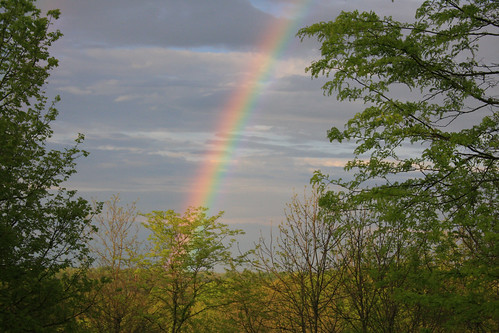
Viewing a brilliant rainbow while nature watching.
(*photo credit)
April 2, 2023 Reliving Palm Sunday
When we wave palms, we recall that we all may suffer from Messiah Complex -- that we have a particular truth that makes us exclusive. We may have truth, but as Christians we must incorporate others in spreading the all-inclusive truth, a way of acting closer to what Jesus seeks to achieve through us. Jesus enters with a triumphal procession into Jerusalem, his city; he is not vested in full kingly regalia and pomp -- only a simple traveler seated on a donkey. He is a king but not a triumphal king reigning in glory, eager to receive the acknowledgment of all his subjects as they line the streets. We are haunted by shouts of "Hosanna" this Sunday and "Crucify him" on Friday. Are they the same people?
Our individual messiah complexes can take many forms. On the individual personal level, we may let slip the words: "I told you so," which assumes that we know the future with greater certainty than the next person. "It seems to me" could sound to some as a manifestation of greater knowledge than neighbors have at this given time. Messiahship may imply acting as if we are special, and this needs to be overcome by humility when we are only one of many saying and doing the same thing. We may wish to have a superior grasp of circumstances, but the better approach is to get others informed and involved as quickly as possible. In fact, a messiah complex is quite tricky and demands for purging a heavy dose of humility, which is often lacking.
At the national level, the American messiah complex goes back for centuries. In fact, the roots go way back into the Puritan dreams when they landed at Plymouth Rock, that they came as the truly righteous among savages. They were followed by waves of immigrants, all hunting for the promised land infested by ignorant natives. Early and later Americans considered themselves destined to lead the way for others to follow, and to impose our Manifest Destiny by a westward movement from sea to shining sea and even northward, had the Canadians not objected. Too often this complex meant imposition of our will through guns in the Caribbean to Central America and beyond, which can only accelerate distaste for this false evangelization. Do we conceive our American democracy in rather fundamentalistic terms, rather than giving others space for their own aspirations expressed in different ways?
Palm Sunday teaches us more about Jesus. What lies ahead is not necessarily a road of continuous success, even though it may be seen as eventually successful with the establishment of the Kingdom of God. We will be humbled in the sacrifices ahead. Jesus enters the fray in a humble way; so ought we. Jesus sees his companions abandon him, his audiences remain fickle, and his message distorted; so should we face limitations that lie in our path with patience and an open spirit. Jesus accepts hosannas but remains determined to continue his awesome mission; so ought we refuse to accept flattery as a mark of distinction. Pray that we overcome our messiah complexes and become more like Jesus.
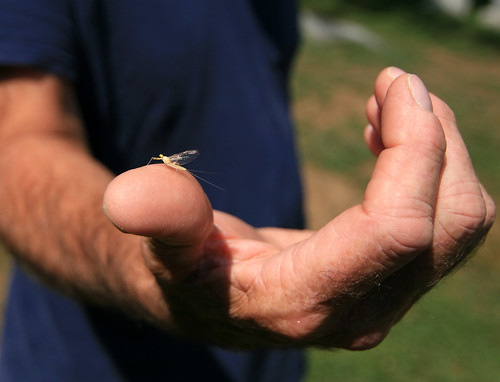
Mayfly sp. (Order Ephemeroptera).
(*photo credit)
April 3, 2023 Seeing Lotteries as Modern Addiction
Recently someone within my county won a sizeable gambling prize, and the feat became known all over the area. Next came the parade of fair-weather friends. It even tempted me to think that maybe I would be lucky also and could then turn these massive amounts of winnings over to a "Center to Show Lottery's Foolishness." But then I realized that the chances to win are less than those of being struck by lightning, and thus returned to my "no-gambling" lifestyle, having only bet one nickel while motoring through Las Vegas a half century ago. Yes, five cents!
Does the lottery craze that is sweeping this nation have anything to do with healing our wounded Earth? We are caught up in gambling with life’s treasures through a gambling financial system that uses hard-earned savings as a basis. We endure a climate of endemic gambling and then some become mesmerized by the hope of striking it rich -- desperate in a system that can financially ruin them far faster than enriching them. A culture hooked on gambling should take the savings and their wages and instead of peeling them off in lottery games, invest them in projects that give them greater security and global betterment.
For many Americans (enough to make lotteries a whopping success with hundreds of millions in prize money), gambling seems to have the opposite effect, which they find heightened when they read about people in New Jersey winning the Powerball Sweepstakes worth a half billion dollars. They think that they will be the lucky ones next time; they feel it in their bones. What they really feel is the hopelessness of poor financial management together with the cost of keeping up materially with the Joneses next door in an age of the fading American Dream. Their overall condition is not improving and thus they show their desperation by taking one more chance. But with each disappointment the gambling addiction grows to an uncontrollable degree, and thus the outlay of even more hard-earned cash. Will it be a spiral that ends with death? And focusing on the worthwhile gamble for economic and political change is held back a little longer.
The mentality of gambling is so detrimental to good citizenry because if all individuals were to win big (an impossibility), the world would no longer need to share. No more financial worries! What makes this such an insidious approach is that everyone at the gambling table is against everyone else -- the opposite of good citizenship. A win will wipe out all problems, or will it? The range of possibility is narrowed to that anticipated victory and does not depend on the hard work of improving our environmental conditions through sacrifice and cooperative endeavors. Soon gamblers see winning as important, and not the struggle to resolve differences, make compromises, and participate as citizens in solving our pressing problems through sharing responsibility. Add to that, gamblers think a portion of the returns are for public education benefits, thus justifying their repeated losses.
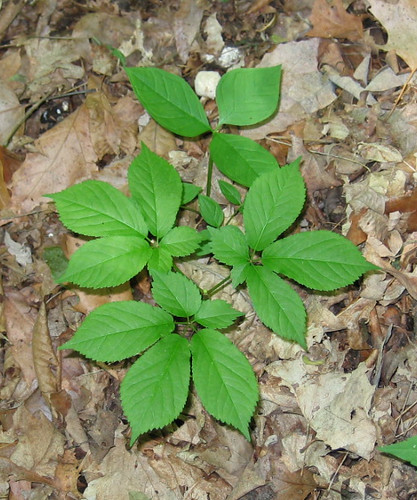
Ginseng, Panax quinquefolius.
(*photo credit)
April 4, 2023 Titling Ginseng: “Queen of Natural Medicinals”
Natural medicinals have been around as long as observant human beings sought to cure illnesses -- and many herbs have salutary effects. There's a ton of literature on this subject with the various effects and traditional claims of wild plants discussed in detail. It's the experience of generations of people seeking primitive cures and engaged in experimental medical practice. This is not meant to be a litany of these claimed or presumed benefits, but rather on one with wide recognition in Far East cultures and in the Western World as well, namely Ginseng, Panax quinquefolium.
For several decades the ASPI Nature Center strived to promote knowledge of and cultivation of native Kentuckian Syl Yunker's "Virtually Wild Ginseng." We did this with an information service, with a handbook on growing the virtually wild ginseng, and by processing samples of the treasured roots for research work at various academic institutions. Furthermore, our late editor Kristin Johannsen authored a valuable addition to medicinals entitled: Ginseng Dreams: The Secret World of America's Most Valuable Plant (University Press of Kentucky, 2006). From an ecological perspective, this still timely book offers challenges to promoters and legitimate wildcrafters of wild ginseng. The book covers a variety of fields: agricultural history, forest wildcrafting and cultivation, medical research and chemical analysis, international marketing, Asiatic cultural practices, ecological protection, criminal justice, governmental regulation, and modern herbal remedies and practices.
Governmental regulators seek to preserve this prized and threatened wild (as opposed to lower quality cultivated) ginseng, which is highly sought by all types of hunters, including poachers. Those operating beyond the legal limits know that fresh and dried ginseng roots sell for hundreds (closer to thousands) of dollars a pound, especially to an insatiable Chinese market with money for any amount grown. The American Clipper ships of the 19th century carried loads of American ginseng to the already flourishing Chinese market that claimed all sorts of curative properties to ginseng eaten or brewed as teas. Governmental agents are also concerned about proliferation of wild turkeys in our forested areas where wild ginseng has thrived over the centuries. The turkeys crush the seeds and prevent propagation. Further threats to wild ginseng come from urban sprawl, mining, and highway construction.
Chemists find it virtually impossible to duplicate wild ginseng's complex composition. However, the main active ingredients are able to be synthesized by organic chemists and the pressure on the natural products could be reduced by lower priced artificial materials. From a standpoint of preservation of native species this may prove to be the best conservation route, though the challenges to commercial synthesis are still immense.

Examining blooms from a wildflower garden.
(*photo credit)
April 5, 2023 Designating Gardening as a Noble Art
No race can prosper till it learns that there is as much dignity in tilling a field as in writing a poem.
Booker T. Washington, born April 5, 1856
Gardeners make the best of April, for this is the month to get serious about launching garden planting in full swing. Dignity is the quality of being worthy of esteem or honor -- and all work can fit that category when done for the glory of God. Much rests with the individual performing the work and not in the specific practice. So gardening can truly be a dignified occupation, hobby, source of food and income, and prayerful activity.
Essential works. In order to create an environment for healing our wounded Earth, we must see the role played by each essential labor activity, whether it be housekeeping, teaching, caregiving, or gardening. Tilling the land allows for producing food in plentiful amounts in a world too crowded to subsist on hunting and gathering. The growth of human population elevates agriculture including horticulture, to the level of essential occupations. Thus, gardening is for many people a means to be fed a basic subsistence in a very dignified manner.
Holistic approach. No doubt, writing prose and poetry, public speaking, administering in sizeable institutions and taking legal actions bring honor and praise. We call the performers of these occupations by dignified titles and hold others in special esteem for their creative endeavors. But Booker T. Washington indicates we can easily overlook the tillers of the land. To till in an orderly and practical way takes experience that calls on the use of brain and brawn, arms and heart, and a sense of courage and trust in nature's cooperation. Gardening is not just sowing seeds and expecting a plentiful harvest. Nurturing, cultivating and providing tender loving care are components of authentic tillage. Plants must be set in place, protected, nourished, watered, mulched, and pruned; prior planning includes variety, spacing, and provision of proper types and amounts of nutrients and water; caring involves the gardener's entire being.
Benefits in dignifying gardening. Many gardening advantages, as pointed out elsewhere in these Daily Reflections, enhance a gardener's sense of wellbeing. People of all ages ought to be taught where food comes from and the effort it takes to produce it. The joy of gardening adds to our spiritual growth for the garden is a sacred space. Encouragement comes to budding tillers of the land especially in gathering and exhibiting the fruit of their labors. The vast resource of potential backyard gardens emerges in America which is too covered with resource-consuming lawn. Finally, touching the soil is our way to commune with Earth herself, for gardening is a training ground for Earthhealing.
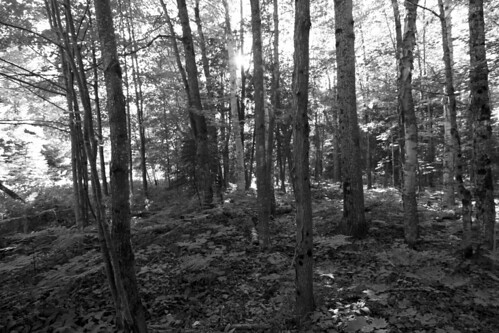
A thriving, healthy forest. Laurel Co., KY.
(*photo credit)
April 6, 2023 Serving Others and Holy Thursday
Pope Francis each Lent is shown on Holy Thursday to wash the feet of prisoners and the poor -- and that makes for a wonderful photo-opt. While accepting that this liturgical action has merit, I do not partake for fear of losing my balance which could come with such sudden movement. Others follow the optional washing ritual and more power to them; they show in a symbolic way the power of humble service by faithfully following Jesus' example of washing the disciples’ feet at the Last Supper. Washing hands is not liturgically correct, but it has some of the significance; people are quicker at washing hands over feet. Weary sandal-clad travelers in ancient Palestine did not want to track road dust into someone's home. Today's travelers may want to use the rest room and wash hands when visiting.
Servicing others is the heart of the issue, and there are many ways to do this. On Thanksgiving, some will take food dishes to the ill or wait on tables at a homeless shelter. On this Holy Thursday we reflect on following Jesus in caring for the needs of others by acts of special kindness. In doing this we enter more formally into the Paschal Mystery of this Holy Week and especially in the suffering and death of the Lord. Today is also Passover time and we remember the celebration of the unleavened bread, cups of wine, lamb, bitter herbs, and the familiar story of the Exodus. Jesus expands the symbols of that Passover event by going beyond the faithful believers showing gratitude to the God who led them into freedom; we take God's mercy to others through loving service with Jesus as minister becoming the sacrifice itself.
The thrust in the ceremonies of Holy Thursday is service to others, but done with a broadening outlook. We cannot ignore or forget the less fortunate in their need and this applies to unfortunate refugees, migrants, and the ill and poor among us -- the less fortunate of the world. This service goes beyond the people and includes defending plants and animals that are threatened and endangered. Such service is a counterweight to the greed and mismanagement of resources so manifest to us all. When there are major oil spills on land or sea, we hear of volunteers diligently washing oil-covered gulls, but wonder whether the washing has much effect in the masses of wildlife damaged. However, it presents us with the need to reform our ways.
We see pedestrians at the side of the roadway and realize how vulnerable these are to powerful vehicles racing past. Right-of-ways and sidewalks are lacking in an automotive culture; remember that when at a road puddle, these poor walkers get splashed. Do we bother? Today's "foot washing" is to defend walkers to get from place to place. All too often the poor are treated as second class citizens in many ways, including the right to travel over government access routes where "Foot washing" means defending foot travelers. Let's apply all that is taken for granted by the privileged wealthy to all citizens. This day can be a good start.

Mushrooms emerge after spring rains.
(*photo credit)
April 7, 2023 Seeing Calvary's Cross Today
Good Friday is the most solemn day for Christians, for on this day Jesus suffered and died for us all. But we have to ask who are the "us?” Certainly, believers are included, but so are included the entire human family in all its parts. Let’s even go farther and say that plants and animals and all creation are within the cosmos of Christ’s sacrifice; Calvary's effects extend to the far reaches of the universe. Let's pause and reflect on the effect of Calvary today:
Wounds of the hands -- Production of nuclear bombs, which could devastate our globe; all military weapons, consuming over a trillion dollars in resources each year, which could easily furnish the basic health, educational, housing and dietary needs of the world's poorest people; discharging military weapons in clashes and bitter struggles throughout the world; manufacturing and scattering pesticides that harm wildlife and human beings living near points of dispersal and beyond; and doing violence to one's self or to other people in many different forms of aggression and enslavement.
Wounds of the feet -- Terrorist attacks on innocent people in many lands; forms of tourism that heavily impact habitat and damage fragile ecosystems; walking away from responsibilities such as breadwinning for families and nursing disabled individuals; congregating with peers who lead one to waste time; travel that carries pathogens from one infested region of the world to another; and processing and transportation of contaminated foods.
Wounds of the heart -- Failure to love others, to show compassion for them, and to recognize the legitimate needs of the poor hungry and homeless people of the Earth; failure to protect threatened and endangered plants and animals; the heartless treatment of senior citizens, the hospitalized, prisoners of war and the enslaved; and failure to take global warming seriously.
Wounds of the body -- Stripping the land of its resources such as minerals and forests; destructive methods of agriculture that cause erosion and soil depletion; pollution of air and water; substance abuse practices that harm the body as well as mind; AIDS and other pandemic threats that go untreated; lack of basic health for the world's poorest people; and the burdens carried that seem so heavy on weak shoulders.
Wounds of the head -- Untreated mental illness and mental grudges and grievances; propaganda that leads to dangerous emotional responses; mismanagement of resources; deliberate racist discrimination; advertisement allurements that harm body and soul; prejudice and insensitivity that overlooks the needs of lower income people; deliberate forms of isolation by or to individuals; silencing of creative expressions; festering anger and hatred of others; and the guilt of past wrongdoing thought not forgiven.

Along the drive to the New Forest Farm.
(*photo credit)
April 8, 2023 Restoring Damaged Lands
Land can be damaged by mismanagement and ignorance. Bob Sears, my long-time Jesuit environmental colleague, asserts that land suffers and remembers harsher moments and thus is in need of healing through prayer to God. About three decades ago, a group of us went to the unreclaimed Black & White Coal Company's strip mine site near our ASPI nature center; we prayed over the disturbed land. Though the site was never formally reclaimed due to regulatory mismanagement, that prayed-over land did reclothe itself rather quickly with vegetation and first-generation trees such as black locust. A revitalization of a resilient but wounded land occurs through slow healing and prayers for restoration. As we await Easter, let's pray for our wounded Earth.
O God, merciful and loving Creator of all things,
look kindly on this landscape before us;
In past times it gave praise and glory to You
through its abundant vegetation and unique beauty.
See it today in the starkness of the devastation
that human greed and thoughtlessness has rendered;
Do not do what we humans so often do, namely,
turn away and deny what has occurred.
In the bleakness of the empty standing cross,
give us the power to look and see
what devastation human beings have wrought,
that we witness with profoundly heavy hearts.
We first ask pardon for human faults to You
and to the land itself in all its gentleness;
We beg forgiveness for it was a human family affair,
and perpetrators went their merry way.
Let this prayer of contrition be something more,
for mere words do not suffice for what has occurred;
Let us pledge to match word with deed
in the spirit of the Calvary event before us.
Now we stand as witnesses before the tomb
knowing full well what we have done,
If not in deed at least in omission
of our duty to care for all creation.
Here we make our pledge to repair as best we can
the wounded Earth around us
and to work for the needed regulations
to keep this from happening again.
O God, Renewer of all creation and Giver of new life,
bring the graces of resurrection
on this harmed piece of Earth;
and allow us to be bearers of its Good News.

Planting a wildflower field for the benefit of honeybees and wild pollinators.
(*photo credit)
April 9, 2023 Proclaiming Easter to the World
On this grandest of days, it is difficult to give a title to a reflection that has so many wonderful possibilities. Resurrection floods our minds with possibilities; the event restores us to the original intent of living in a garden of hope unburdened by pressing needs. This loss of innocence cries out for redemptive restoration -- and that has been achieved in the suffering, death, and resurrection of Jesus as Lord. The historic reality is that death has been conquered and through Christ we are promised new life, a life recognizing God's gift of faith that Christ restored life to us, and we also become renewers of life to others.
Easter means choices fully restored, for we can truly choose life over death through the creed we profess and the deeds that we perform. Jesus is "the resurrection and the life," and that is now manifest in history. Life takes on a fuller meaning, and we no longer see death as conquering but resurrection as the invitation to fuller eternal life. Being "Easter People" means that we have the banner of victory in which we truly believe that this world can be enlivened through the power of the risen Christ.
Easter points to assured victory even though we are still in the middle of a battle of establishing God's Kingdom. The unfinished nature of this struggle must not depress us, for ultimate victory is beyond the horizon. However, we desire to hasten this event through our efforts now given in the power of the risen Lord. This power is for faithful people to spread the Good News with enthusiasm, for Christ has conquered sin and overcome evil. The Jubilee is near and we can hasten that day.
Easter gives us the hope that we can make a difference. We are no longer powerless because we have the Spirit within who moves us to proclaim that we are in God's company now. We have become instruments of change and restoration; as long as we see it is coming from God and not our efforts; yes, we can so empowered make a difference. Restoration means bringing back a balance t o a world that has been thrown out of kilter due to human greed and mismanagement. As invited into the Easter event we find the God within who empowers meaningful action, to which we accept our participating role. In the resurrection we conquer.
----------------------
Modern temple-cleansing, an unpopular task,
We find no applause, a touch of glory from the past,
Visit the sick, do mercy's works for sure,
Follow Jesus, bearer of the poor.
Accompany him in this desecrated world indeed
Stand up with others, take Abe Lincoln's lead,
Don't tolerate a world half indebted, half free.
Yes, a sign of cross in awesome Trinity.
----------------------
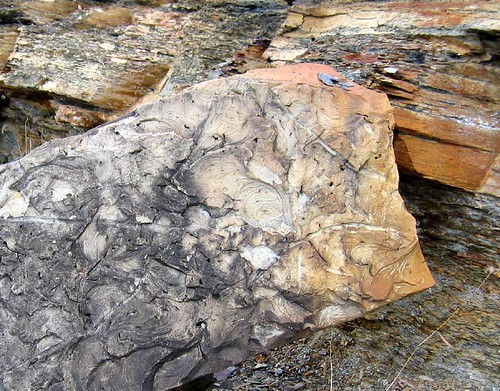
Mississippian Zoophycus trace fossils in Eastern Kentucky outcrop.
(*photo credit)
April 10, 2023 Celebrating Pierre Teilhard de Chardin
On this day (Easter) in 1955 the Jesuit Teilhard de Chardin died in New York at 74. He was a paleontologist by training and also a theologian as witnessed through his writings, which would only become well known after his death. He died at the very time I was considering entering the Society some seventeen months later; my further interest was raised by reports in the media that he was a noted scientist and a Frenchman like my ancestors. Most of his more extensive writings only became available over the next few years following his death. During my philosophy studies I read the English translations of The Divine Milieu and The Phenomenon of Man -- and was deeply moved.
Teilhard's life and works inspired me and many others in those pre-Vatican II days that a broader perspective was possible. Really, it was both approach and content that was so appealing -- and in some ways his creativity and freshness on evolution set a tone for profound changes still to come then and now. He was not afraid to pioneer new intellectual frontiers when others were seeking to always appear safe in what was taught and retaught. Even today Teilhard comes to a dry world as an adventurer who is quite poetic, intuitive, and manifesting a happy blend of science and cosmic vision in ways never previously expressed. Teilhard's writings show a spirituality enhanced through his Second World War years in China, his research, and his international connections.
Teilhard's works are difficult to categorize; they are certainly not Scholastic in style and, while containing a modern scientific worldview and terminology, are not analytic. In Teilhard's world view Christ's incarnation takes immediate root in the wedding of scientific knowledge and his firmly held religious beliefs. Teilhard sees the divine truth of Christ's drawing, through his redemption, the universe to an Omega Point, the terminus of the natural evolutionary process. Christ energizes this natural process and thus is the Alpha and Omega, the foundational source giving direction to the movement of history itself. For Teilhard, that movement is towards greater complexity and a higher consciousness. In some ways, this has influenced my own firm conviction in the growth in social consciousness.
Having said all of this, I'm unsure whether I share Teilhard's overwhelming optimism, born perhaps in a spirituality seeking to cope with his tragic circumstances of having to endure a major war on foreign soil. He did not dwell on the limits of technology. All in all, his spirituality is sometimes described as a shared Ignatian and Franciscan vision of the universe -- something many of us find appealing in this time of Pope Francis. This involves a practical approach to seeing God in all things and an almost mystical grasp of a world on fire with divine love. We are not mere observers but participants in this movement to greater love. His views were grains dying to generate a plentiful future harvest; they are offered gently and firmly to everyone, and are fundamental for those seeing science as revelatory.
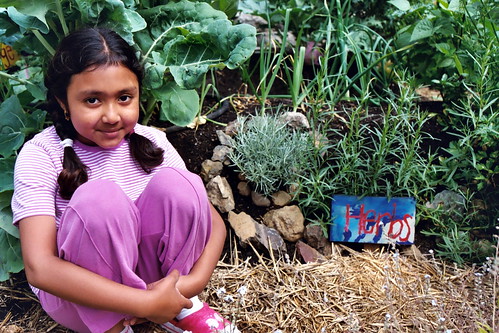
Hard work creates lovely herb garden.
(*photo by M. Bish, Creative Commons)
April 11, 2023 Encouraging Young People's Herb Gardens
As spring emerge in its freshness, it is an opportune time to introduce herbal gardens to young folks. Several goals can be attained in one program: teaching youth to garden, beautifying a landscape, furnishing fresh herbs in daily diets, and allowing the teacher to advance in herbal knowledge. This garden need not be a separate herbal plot, for the plants can grow quite well intermingled among the veggies. Youth can quickly sense herbal beauty and utility, though they may not wish to maintain an extensive herbal enterprise. Some suggestions include:
* Plan a proper-sized garden. The smaller the child, the smaller the herbal patch. Overly large herbal gardens take more effort, and some of this may fall on the sponsor when the youth are away at summer vacation or highly distracted by academics, athletic programs, or other distractions. Don't create a burden for yourself or youth. Working with older siblings or friends may make the project more successful.
* Think variety. Try a variety of herbs for some may not fare so well and surprisingly others may flourish. The young people may favor an herb due to smell, taste or looks even when you would select others, but all choices should be honored.
* Consider educational signs. Label the herb containers with the common names (scientific names for older youth) so the youngsters can see and taste the herbs and come to an extensive herbal vocabulary at an early age. Visiting friends of youth can learn from what is done and aspire to do the same.
* Encourage youth to share herbal products. Pots of living herbs make wonderful gifts (to parents, grandparents and others) with the work of the youth stamped upon them. Encourage them to google the herb and offer gift suggestions as to use in soups or salads, and indicate how the various herbs are traditionally used in ordinary dishes.
* Give the herbal site its own prominence. Be proud of what the budding gardeners can do. Spend a little time looking over the plants, suggest that they tell their gardening feat to others, open the way for "show and tell" in school, and ask the youth to provide pots for floral displays in various indoor (or outdoor) events. The projects are great opportunities for scout merit badges.
* Harvest and care for herbs in winter. Most herbs can be dried easily or their seeds (dill or basil) can be gathered. The potted plants can be brought indoors next fall as a beginning for next year's herb garden season.
* Spread the word. Herb growing can become part of the growing agenda of activities by the young, for gardening offers spiritual, psychological, ecological, and economic benefits. The many advantages of gardening mentioned in these essays can be duplicated in the herbal garden. We need to enlist as many folks as possible to good aspects of gardening; young herbalists are fully able to spread Good News.
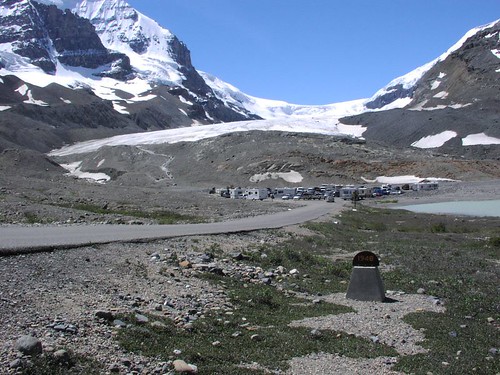
Rapidly receding Athabasca Glacier.
(*photo credit)
April 12, 2023 Becoming Aware of Global Warming
We are stewards of our Earth; for we have within our capacity the changing of climate for better or worse -- a feat that no previous generation dared to dream about. Too much of any substance, whether carbon dioxide or methane, can be friend or foe; this is similar to ozone where small concentrations are needed to protect the upper atmosphere and larger quantities at ground level make it a major pollutant. Likewise, carbon dioxide can contribute to the Greenhouse Effect with a relatively rapid rise in temperature and other anthropogenic effects on the environment -- some say a catastrophic two or three degrees rise by 2100. Furthermore, common methane in large amounts can be a pollutant with high climate change potential. Earth is fragile.
Jim Hansen, a highly respected scientist and former director of the NASA Goddard Laboratories, became one of the first to influence our government to take global warming seriously. Some have attacked him for abandoning his "objective" scientific expertise and venturing beyond to governmental policy as though that is forbidden. His response is that global warming can be predicted much more accurately than is generally realized. Given the power of governments, sluggishness on carbon dioxide regulations could contribute much to the threats to our planet. With all the hype about fracking, many also forget that the relative abundance of commercial lower-priced natural gas does not mean necessarily a "cleaner" fuel if unmeasured larger amounts are escaping into the general atmosphere.
We must take climate change seriously because global warming could have some very bad effects that will affect poor folks living near rising oceans enormously. The vast effort at building a military machine is foolishness compared to the demands for ushering in a non-carbon economy –- a global task of true security. During international meetings all nations are sensitive to difficulties ahead, but there are no existing regulations binding on all nations. The scene is not pretty even when various nations testify to national policy carbon reductions and yet need to move aggressively to a non-carbon renewable energy economy of solar, wind, hydro, and geothermal. Cheap natural gas on America's part is retarding the speed of that transition as is the continued filling of global energy needs by fossil fuels. Each year is experiencing new global heat records.
We cannot continue to ignore carbon dioxide and methane imbalances or we will experience rapidly rising temperatures, melting of the Antarctic ice sheet, inundation of low-lying nations such as Bangladesh, shifting of growing seasons, plants and animals unable to cope with changes, and spread of tropical diseases into temperate zones. Yes, there are climate change deniers funded by Big Oil and some billionaire dark money (unreported and passed through front organizations). Believers in the future must speak out while there’s a window of time.

Early spring magnolia blooms in Kentucky.
(*photo credit)
April 13, 2023 Critiquing Spectator Sports
A good practice in spring after a winter of sports is to review our country's and world's infatuation with spectator sports; it's not so much participating in games for good physical exercise, but rather in the wild acclaim given at spectator events to professional and college athletes who perform. Overly competitive sports have become a part of a global consumer culture to a degree never before witnessed. An ancient wreath of laurel to victors is long gone. In place of these are TV rights to games in the tens of millions of dollars, special advertisements, million-dollar commercial contracts for the more gifted, or at least a promise to the colleges and minor leagues that the best will be endowed as such. What about sport's clothes, caps, pennants, and related consumer paraphernalia to attract fans to commercial hype, all termed fun and with the shouts of multitudes to prove it?
The competition hype makes for sales of tickets to sporting events and support of massive TV contracts to show games. Instead of fans looking for good play by both competing teams the thrust is to win for the home town folks and to do so with cheers and near or actual rioting. A while back, the noise of cheering Seattle fans brought on a minor earthquake and a record for the Guinness Book of Records. This led to a matching eruption by other competing teams with measured decibels one tenth higher, and so the shouting has started with little concern for hearing loss by fans.
False consumerism champions such activity, for the more the shouters, the merrier, and that means more money for continuing the foolishness. The ancient Roman bread-and-circuses mentality still holds sway among multitudes in our modern world who strive to be placated through mind-changing events. Super-bowls, World Series, 2014 World Cup, and NCAA Basketball championships all have gathered immense audiences, with all the hoopla of ads, events, and shouting near the stage or at least at a TV screen -- forgetting that the hollering does little good and even causes those minor earthquakes. Did you ever think it would be wiser to cheer the victor whatever side he or she is on? It's less heart s tress by all parties.
Runaway sporting events involve outlandish salaries paid to athletes along with a dark side seldom mentioned. Over enthusiasm for sports takes many lazy minds off of the real problems that also involve global competition of a sort. A broader but less discussed competition is for the planet's limited resources, with a small number of haves being the privileged elite on one side; the other side is the vast majority of have-nots being deceived to keeping silent and being respectful of the champions of the stock market and Wall Street. There are only subdued cheers as some make billions with lucrative governmental support while others buy lottery tickets with meager wages in vain hopes of entering among the chosen few. The game can be serious or just foolishness.
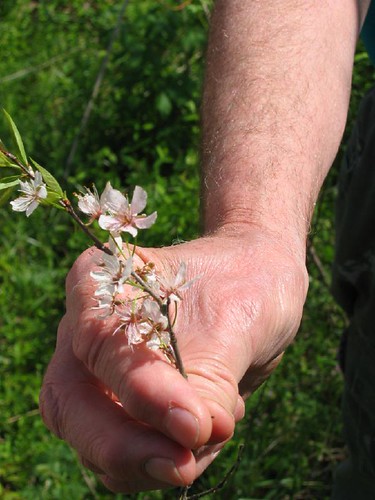
Admiring the blossoms of a wild plum. Franklin Co., KY.
(*photo credit)
April 14, 2023 Giving Praise to God by All Creation
This is World Habitat Awareness Month, a time to appreciate the immense natural beauty and fragile nature of wildlife habitats. When we hike into wilderness areas, we observe scurry of wildlife as a new generation is coming to life; we hear bird songs that soothe our ruffled souls and we know that this habitat is a prayerful place. Scripture speaks of creation's great praise: Let the heavens be glad, let earth rejoice,
let the sea thunder and all that it holds,
let the fields exult and all that is in them,
let all the woodland trees cry out for joy. (Psalm 96:11-12)
Wildlife habitat not only is a sacred place, but a fragile one as well. Habitats can be easily damaged by human greed and mismanagement -- and yet harmed habitat can and does give praise as well. We are quite confident that pristine lands are full of joy, but we must not so favor the sounds of singing land that we overlook the scarred and eroded landscape that cries out as well. In fact, we are to fill in what is wanting when land suffers; and furthermore, we are called to bring Good News to all creation (Mark 16:16): "Renewal is coming" -- through God's grace and our helping hand. We praise God for giving us the courage and strength to become and remain Earthhealers in trying times.
Through free will our human offerings of praise surpass all other creatures, which offer praise to God by their presence and life. When we human beings suffer and freely offer these sufferings to God, the quality of our activity reaches a higher point, but it takes that free will offering to make it especially praiseworthy. Can a wounded creation that has no free will give praise? A healthy natural habitat moves us to great joy and praise; a wounded habitat triggers within us an activism to halt the damage and thus enter into the healing process through our responsible joining with Christ at Calvary -- a participation in the salvation event. Through our sacrifice we renew our Earth.
Should human beings turn away from planetary damage through denial, excuse, or escape then the role of Good Samaritan to Earth is lacking. Our lost opportunity for giving praise is turned from blessing to cursed greed and temerity.
Yes, all creation of which we are part, gives praise with and through us as human beings. When we are disturbed by damaged creation, then we might t urn from praise to the temptation to distraction, uncontrolled anger, or even despair. When we human beings cause the degradation of the Earth and then neglect to heal wounds, we are at fault for allowing this form of "sacrilege" to continue. If we have a habit of vocal praise with and among others, we are motivated to act for our threatened and endangered brothers and sisters. The discordant notes of a suffering Earth ought to motivate us to help restore all creation to greater glory. Earthhealing becomes a more glorious form of praise, for it ushers in a creative act of renewing what has been damaged.

A quiet moment by the shore.
(*photo credit)
April 15, 2023 Reflecting on Global Differences
Thinking about major distinctions in our world such as “North” and “South,” “East” and “West,” or “First” and Third World” has its limitations. However, there are clustered industrialized or developed areas and richer and poorer ones as well. On the other hand, we find it difficult to use twentieth century terms of "first," "second," "third," and even "fourth" World. This was popular during the latter half of the last century, when the USSR and its empire held sway in much of Eurasia. At that time the Western alliance and Pacific Rim was "First World," the Communist bloc "Second World," and the rest split into "Third" and even "Fourth World" neutral or poorer designations, the latter being hopelessly indebted or dysfunctional nations (e.g., Haiti).
On the whole, we considered the "Third World" as underdeveloped and preparing to rise and be like us in the affluent lands -- the "First" World. Classes of nations may exist on some economic scale but biases also accompany them. Are the less consumer-oriented lands really "less developed" or "un-" or "underdeveloped" countries? What about "emerging" nations - and we ask from where and to what? The truth is that some of the "First" may be spiritually the least developed when it comes to a sense of sharing and concern for others. Does our materialistic culture make us something to be emulated or to be shunned? If enough lands, including emerging China and India attempt to be like us, our world will collapse through greed and overuse of resources. Are the terms "have" for some countries and "have-not" for others given a materialistic sense of possessions as primary determinate of class?
These pertinent questions hint that categories of nations are somewhat unrealistic generalizations. However, differences do exist at least in access and use of resources and to levels of equality and happiness. The poor, the Anawim of Scripture, and the "low-income" among those lucky to have jobs, desire to live a good life and have an honest livelihood; many migrate for economic reasons from poorer to richer lands. Categories seem to give sense to the global situation, but also betray inequalities that really exist in our fractured world where, in Benedict XVI's words, "globalization has made us neighbors but not yet brothers." The categories we impose make us aware of the unfinished tasks of social justice that still lie before us. Classes ought not reduce responsibility, but rather prick consciences to hasten change.
Ultimately put, "Third World" became an outmoded lack of collective sensitivity to the needs of others. We made them into a problem area and set ourselves apart, in gratitude for being privileged. The story of Lazarus reemerges with ever greater force on a global level. We were Dives -- the rich man; we came to see a Third World at our doorstep and even the dogs came and licked their sores. But things are different, and we perceive the need for global unity and oneness – not economic differences.
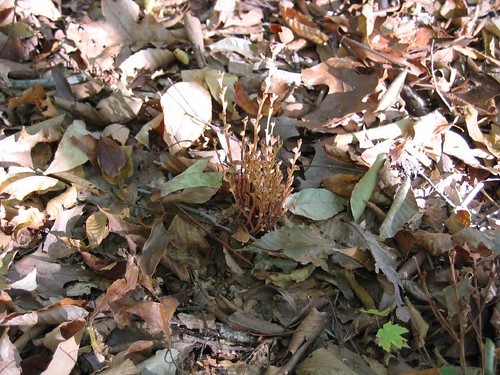
Epifagus virginiana, beech drops, parasitic plant of roots of beech trees, near Oak Ridge, TN.
(*photo credit)
April 16, 2023 Revealing New Saints in Our Times
This is Mercy Sunday and we hear again that the peace of the Lord is with us in many ways. One of these acts of mercy on God's part is to give us new saints who were with us on Earth a short while ago and now help distribute divine blessings from their place in heaven. Saints help call us to an eternal home and show us that our connections are not purely on this planet alone, no matter how much we desire to care for Earth. A decade ago, a million-faithful gathered at St. Peter's in Rome to celebrate the canonization of Blessed John XXIII and Blessed John Paul II, two noble popes of the twentieth century who left major marks on the Church during that century and beyond.
John XXIII, Angelo Giuseppe Roncalli, Patriarch of Venice, lived through a brief pontificate, but one charged with change. The conventional wisdom was that he was a simple but deeply religious person who was at older age elected as an interim between Pius XII and a new and younger person to follow. However, the Spirit led him to overturn the tables of convention and to call a general council in the Church to bring it into the modern era -- and he was willing to make changes. John did not live to see the conclusion of Vatican II, but his mark (1958-63) was indelibly set from the start of the gathering; thus, we have major reforms including the English Mass, liturgical reform, revival of the permanent deaconate, and a broad opening to other faiths.
John Paul II, Karol Wojtyla, became the first non-Italian pope in four centuries and was to last as one of the longest reigning, from 1978 to 2005 (27 years). He also left an indelible mark on the Church partly by being the most traveled, highly involved and charismatic, and by being seen by more people than any other human being in history. He had a very wide field of interests and helped bring down the Iron Curtain through his strong support of the Polish Solidarity Movement among workers. His personality attracted many including youth and thus he initiated a number of World Youth Congresses. His papacy was an act that was hard to follow, though his youth and vigor waned over time; this was due to effects from an attempted assassination and also to late life illnesses.
Today, we need good models of leadership in the Synod currently being called for by Pope Francis and reaching completion this year. Both of these two new saints, due to newness in approach by John and energy exhibited in world travels by John Paul, are needed as models for our twenty-first century. The major changes call for people of faith who are willing to truly believe that changes in the form of spiritual revolution can and will occur, if we put our hearts and minds to the task ahead. It takes more than leaders, and thus the spiritual empowerment must come through divine grace to excite participation by the entire ranks of our Church. Both of these new saints are being called upon to help move the Church forward in critical times.

Monarch, Danaus plexippus, on goldenrod.
(*photo credit)
April 17, 2023 Celebrating Metamorphosis and Butterflies
The bright butterflies that now are appearing near late April's flowers and mud puddles have a colorful history. We hear that the monarchs are on their thousand-mile trip back from Mexico; those other butterflies present have not traveled so far but have undergone a "sea change" through a normal biological development, which we find marvelous to behold. Our dictionary defines "metamorphosis" as a physical transformation more or less sudden, undergone by various creatures during development after the embryonic state; an example is insect larva to the pupa and this (usually as a cell or cocoon) to the adult. Thus, the caterpillar crawling about on its many legs becomes a flying colorful butterfly in its adult stage. What line of experiences in one short lifetime!
Make a butterfly garden. We can focus on flowerbeds that are coming to their full radiance soon in May or to specific gardens created to attract the butterfly. We find a sense of joy in seeing these winged delights flitting about. In younger years I was willing to kill many crawlers, and especially tobacco worms, but never on the butterfly; they were too delicate to harm and need additional protection. Extension services offer suggestions as does added support. Applied Ecological Services, Inc. at Brodhead, Wisconsin. Google website for information.
Butterfly places. One of my treasured visits was to the butterfly center, Jardin des Papillons, at Hunawihr (famed for its church surrounded by vineyards and stork nests) near my ancestral home in Alsace. This is a massive greenhouse with many plants and many butterfly species in every color and shape, graceful creatures flying about as though they had no care in the world. They are of different sizes, colors, and endowments but they get along so well. Places closer to home include the National Butterfly Center <nbc@nationalbutterflycenter.org> in Mission in south Texas; this center is home to over 210 species of butterflies.
Butterfly resources. Many nature lovers wish to attract butterflies like they already attract birds. A host of good suggestions can help with the transition: how to make butterfly gardens, where to buy books, pictures and drawings of these colorful creatures, and how to attract hummingbirds and butterflies. Butterfly promoter or admirer become activists when they are willing to undertake a butterfly count (on July 4th in the U.S. and July 1st in Canada).
Spiritual application. Reflection in a related question: Do human beings move through their own metamorphosis? Do we start crawling and then move from a lowly stature to higher aspirations during maturation? With time we retreat and then advance to more realistic and colorful periods of life, and take flight in our dreams and future horizons. We are sort of like butterflies.

Star of Bethlehem, traditional plant of Appalachian gardens.
(*photo credit)
April 18, 2023 Affirming World Health as a Global Goal
We celebrate World Health Day this month and wonder whether this is understood in its fullness by the world's people. Many of the poor realize that health care is sparse and not perfectly executed: the health care varies from person to person. Must we be satisfied with the disparity of health care reflected in longevity of life, rampant diseases among the poor, obesity and its ramifications, and unavailability of some health treatments? Should the commons be sacrificed so that a privileged few have health benefits? One can argue that global security means higher quality health for ALL our brothers and sisters? Our own responsibilities ought to include:
* Provide basic health care. Though it is impossible to immediately provide the newest medical technology to all people, still basic health care in the form of vaccination for common children's diseases and treatment for malaria and skin diseases are attainable goals. Such possible worldwide treatments would require just tens of billions of dollars used for global health care. The money should come from a military budget, for the military does not give true security.
* Encourage more comprehensive medical research. All too often our medical research goals are based on profitability factors and not on a priority of need. However, in many so-called underdeveloped lands, basic medical research is lacking; drugs and treatments are simply not currently available. One answer is international funding, since local sources are insufficient.
* Keep doctors at home. This is a challenging subject since we all know good health providers who have come to parts of America to assist in providing needed care in lower income neighborhoods -- we have many in Appalachia. Still, we are here on the receiving end of a brain drain in care givers and appreciate their great devotion here. However, their returning income is not equal to their expertise had it remained in their homelands. From a global perspective ought health care workers emigrate only with assurance that exchange programs exist in their country?
* World inventory of health needs. An inventory by the World Health Organization is needed because individual governments are reluctant to conduct such in an objective manner. We must know the health situation in order to tackle problems collectively -- for world health and not national health must be a UN goal.
* Health care and informal education. Formal health education is highly costly. The population needs to be taught within the social media how to prevent illnesses. This education should include holistic and other alternative health programs, available nutritious foods, and halting substance abuse. Anti-smoking campaigns are needed at a global level.
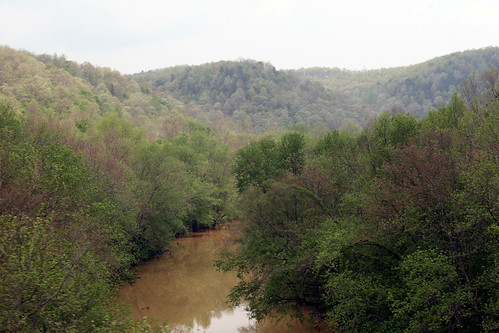
Emergence of green along the Rockcastle River near ASPI, welcoming spring renewal.
(*photo credit)
April 19, 2023 Driving Problems and Seniors
When you were young you put on your own belt and walked where you liked; but when you grow old you will stretch out your hands, and someone else will put a belt round you and take you where you would rather not go.
(John 21:18)
One of our parishioners had just been told that her peripheral vision was impaired and she could no longer drive. This news is common among older folks who sometimes report having unexpected accidents on the road. Though I have reduced my driving to daylights hours on only local familiar roads and when the weather is right, still problems can easily arise. We know that age and its diminishment does take a toll on the ever-speedier highways and the congestion associated with them. Driving is a public act that not only affects the driver but passengers, pedestrians, and those in other vehicles that pass near. The fact is that to drive on our public roads in a motorized vehicle takes a certain level of mental and physical stamina and ability, and awareness of conditions that change with time in any season of the year. Driving privileges must give way to driving less and finding those who will help when longer distances are necessary.
An added consideration for elders in this Appalachian region is that many roads are narrow and speeding vehicles can appear unexpectedly. We have to be all the more careful due to human safety and financial (liability) reasons. Family members are keenly aware that they may be held responsible if there is a costly and fatal accident, because they have permitted members who are unable to drive safely to continue driving. We simply should not take very grave chances.
A second consideration is that the flow of traffic has increased and even exceeds posted speed limits. Likewise, people travel to close to the preceding vehicle and so in bad weather pile-ups (a series of accidents in a row) frequently occur. Far too many drivers out there are insensitive and take risks as well, and cut in when the distances between autos are minimal. Only the best defensive drivers can cope with congested and deteriorating situations. This argument extends the problem to the social realm beyond that of individuals whose driving powers are eroding. Safety deteriorates near holidays or on Fridays after the end of work week when many want to get home quickly.
A spiritual reflection. Each of us is to obey God's will at all times and especially when we must curb our mobility. Times are changing: we put on seat belts and check tires and fuel; we ought to check our own physical and mental condition and realize that letting go is part of life -- and the driving privilege is one such. To do this graciously is a sign of a deepening spirituality and an immense teaching moment in each of us and our associates. We pass from independent to semi-independent living and driving is harder. Aging won't stop but perhaps we must.

Violet wood sorrel, Oxalis violacea.
(*photo credit)
April 20, 2023 Recognizing Conservationist John Muir
John Muir was born on this date in 1838. We may wonder whether this nineteenth-century lover of the natural world in which he immersed himself would be satisfied with his many modern admirers. In reading his life a few years back, some three characteristics that we need to reemphasize today stood out: his doing things on his own; his consistent love of nature throughout life; and his willingness to live the simple life while being a conservation activist.
Many of us hesitate launching out on our own, whether into wooded areas or other unfamiliar territory. As we begin something new, we find a handful of critics and so-called experts who glory in shooting down what we strive to do. Creativity takes on more restricted confines in the 21st century -- and yet we are called to be people seeking radical change. Most of what we dream up doing can be easily shot down by status quo seekers, and this tempts us to avoid the range of their critique. Actually, the environmental movement can become a little inbred from lack of new blood. Are green organizations able to welcome people with new ideas? Do old-timers hold on too tightly? Do youngsters get discouraged?
In today's busy world, we who champion the environment seem to have less time to live outdoors and take time to reflect on scenic beauty. Do we accept nature as our guide and friend.? In some ways, this very essay is a contradiction, because it takes up time indoors that could be spent in our great outdoors along with natural sounds to touch our souls, smells and tastes of April's goodness. We yearn for fresh air and full spectrum sunlight to lift our spirits. Slowing down in the Muir manner would be helpful right now, for we have to find the hikes and meditative time needed to be out on our own, so that nature educates us. Sometimes this must be done alone, and John Muir shows the way through his life journey.
John Muir focused on some of the lands he traversed and called them special sites (e.g., national treasures or eventual national park candidates). His activism came through simple means of communication, but he was relentless in advocating for these national treasures. Today, we are equipped with the latest in computer equipment and Internet access, which require constant upkeep, protection, and intercommunication through search engines. Pretty soon our own simplicity is being compromised, because it takes time and other resources to stay relevant.
We need to see that Muir's simplicity is part of the message, just as much as composing, editing, and publishing. Granted, to live simply takes an effort, but that makes the message more sincere and attractive. The world craves a path to cut through the complexity of life and that was John Muir's greatest contribution to conservation and environment.
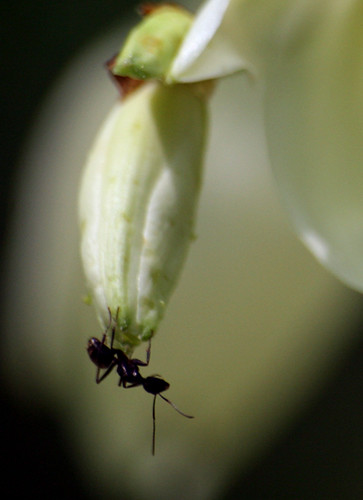
Tiny ant takes center stage on flesh flower bud.
(*photo credit)
April 21, 2023 Connecting Sun Day and the Commons
The community of believers were of one heart and one mind; none of them ever claimed anything of their own; rather everything was held in common. (Acts 4:32)
On this "Sun Day" we ought to consider our brother the sun and how it warms us, gives us the energy to live and grow, and enlightens us during our lengthening daylight hours. The sun is at the heart of renewable energy alternatives that are benign and must be used to heal our wounded mother Earth. This Sun Day anticipates a deepening concern about the condition of Mother Earth with its more generic environmental perspective. Today, we consider the portions of the environment that have been harmed by fuel extraction and emissions from non-renewable coal, natural gas, and petroleum fuel sources. Our attention is drawn to the overhead sun, and to the solar and wind (ultimately solar-related) energy that is renewable and a component of a sustainable non-fossil flue future economy.
The Commons extends beyond the overhead sun to cover a wide range of our environment. Our air is part of the commons and should not be polluted by one or another group pretending to "own" it. In the same way our potable water must not be mistreated by individuals or institutions for selfish reasons. Furthermore, the commons extend to oceans, lakes, and rivers covering a major portion of our Earth and to certain land areas such as Antarctica, the Arctic regions, high mountains and wilderness areas, and large parts of forested areas as well as parks and designated heritage sites. Even land has common space such as the public squares in New England towns. What is actually common is far more all-embracing than what is held as private property -- even when admitting that individuals can be stewards of private property.
The Acts of the Apostles describes a primitive Christian commons. Believers took the welfare of fellow community members so seriously that they shared all in common. Really religious communities throughout the world within their believing group. Such sharing is an extraordinary practice that cannot be imposed by harsh legal requirements, but must be spontaneously part of our expression of humanity. While we can be stewards of certain delineated areas of land, still we need to share these resources with others.
Solar and wind energy is ours to direct to the proper use of all people in need. These are commons to be shared, not carved up as gated communities of profit. Scripture and Sun Day are related, because both say we must share resources. On this day we confirm commonality in energy needs and point out that all of us have a responsibility to assist the needy. Solar and wind can be harnessed using taxable financial resources now used to process, transport, and protect non-renewable energy resources. May all people find a higher quality of life by utilizing solar energy.
Earth Day 2023
This year's Earth Day theme is Investment in Planet Earth. Many options come to mind:
Fossil fuels replaced by renewable energy investments; start gardening; help maintain a forest; educate or demonstrate ecologically, etc.
But to avoid a possible catastrophe through climate change neglect, we need more, for war is destroying our sense of global cooperation. We need to invest in peacemaking, and we need to call on God, our spiritual guide. We must do so ASAP.
Al Fritsch
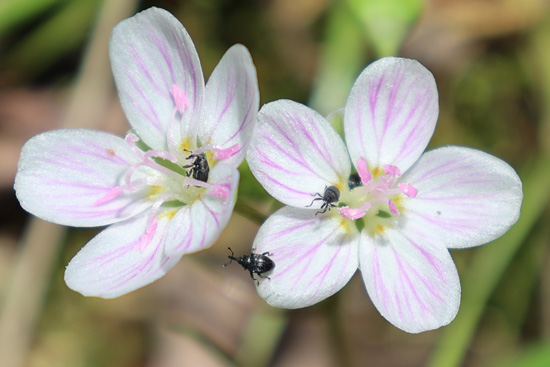
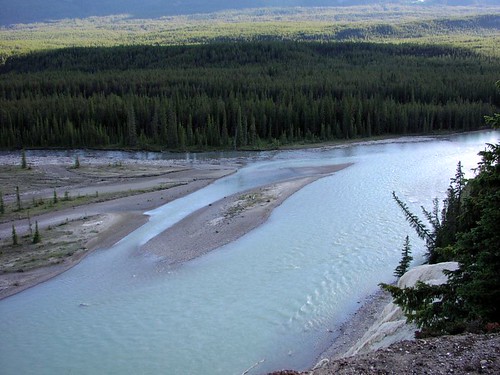
Sky meets Earth.
(*photo credit)
April 22, 2023 Reflecting on Earth Day 2023
We have only one blue-green Earthship and need to make the best of God's great gift to us and the universe. We approach this day with mixed emotions: gratitude for the beauty of our planet; concern about its fragile nature and how some have exploited the delicate balance of our environment; anger about how we allow this to occur without raising our voices in resistance; and resolve to expose damage and to strive towards solutions through physical work at the local level and political involvement at the state and national ones. We know that climate change haunts us, but we are not to throw up our hands and say it is no use. Rather, our action must include a resolve to be faithful in working to heal our wounded Earth. Our overall attitude ought to include facing problems for what they are.
Make a stark appraisal. Our Earth Days turn out to be more than a celebration, for no survivors on the beaches of Dunkirk in 1940 celebrated. We are on the beaches of time to do something about challenging an unsustainable carbon economy that must be transformed into a sustainable renewable energy one. A token recycling practice and annual tree-planting exercise is not enough; we need to move to a radical change in viewing our operations, but see that it takes more than our views alone; we throw in the pebble to start a ripple effect that goes out to all the world. Earth needs care and we must all participate as best we can.
Become countercultural. We cannot afford to go along with the crowd. If we do, we will expect grandchildren to watch oceans rise when icecaps melt and possibly endure more frequent extreme weather events. Part of our program is to create trust in what we can do and simultaneously a distrust in a billionaire-laden economy of extreme wealth and inequality. A greater equality will create a new climate change of mutual trust and lessening of the insecurity of terrorist desperation found in parts of the world. Part of equality is to free the locked up financial resources of the world and apply them to address the endemic unemployment of our age. With growing security, the massive military/industrial complex could be tamed and a portion (perhaps a half trillion dollars) could be used to restore the infrastructure of our wounded land. With faith this can be done.
In reality, this Earth Day is far more sobering than many in the past. Our window of environmental grace is certainly narrowing, for we see the effects of physical climate change. We must do things at all levels of endeavor: public and private, local, state, national, and international levels. This Earth Day does not need any more grand-standing as in its early days. It's time to act and to do so quickly, and not to allow this Earth Day to be commercialized by industries or six figured-income non-profit spokespersons. Earthhealers must joint ranks to save our planet and this Earth Day is time to strengthen this resolve.
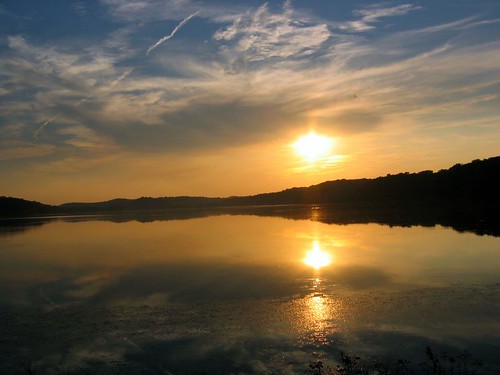
Spectacular sunset.
(*photo credit)
April 23, 2023 Building Community through Works of Mercy
Nothing can solidify the bonds of community tighter than to be with those who suffer, whether through illness, imprisonment, or compassion at the death of a loved one. The same can extend to those who lack basics of life, or those to whom we instruct for acts of unexpected kindness. Each work of mercy that we perform takes some effort on our part, but besides our basic responsibility of going out to others, we realize that this act is an investment in the social capital needed to make ours a thriving and loving community.
Visiting the sick or those who are shut-ins is a challenge. Just how much should we say to the ill person, so we call on the Spirit to find us the right words? Entering a hospital room harks back to academic debating days when a new topic is thrust upon us to debate in public. We find the ill in a variety of unexpected conditions: troubled, resigned, sleeping, unconscious, puzzled, smiling, crying, frowning, pre-occupied with TV, or distracted and needing a nurse. Illness is an opportunity to join with the Lord in suffering for the salvation of all, a foreign concept to many whether churched or not. Sickness has meaning when united with Christ’s sufferings on Calvary and this is a gracious message we can give the ones we happen to visit.
Attending prisoners takes a special talent and grace. The challenges can be multiplied because jail or prison conditions limit privacy and conversations. Quite often the prisoner is angry with self, relatives, friends, or God. Here we wonder whether we are suited to handle the situation, but at least we can give a sympathetic ear to the problems that we hear. For only a few brief moments as visitor, we must size up prisoners' situations and respond accordingly. Of course, their resignation to what lies ahead is the easiest situation and their anger the hardest to handle. We need to be inspired, inspiring and cheerful throughout, no easy task.
Teaching others calls forth much of our deeper reserves of spiritual resources, because we must make contact and exude a confidence that we hope is present. The wayward student may be reluctant or unwilling to spend time in study and preparation, and that leaves a volunteer teacher somewhat overwhelmed and hoping to succeed. Instilling confidence into t hose struggling is a mark of a good teacher who is called to spread Good News.
Attending wakes and funerals is another challenge. We know how much the bereaved appreciate the visit no matter how brief. We are willing to console just as we know it would be so comforting when we lose a loved one. It is always easier to comfort believers who realize the power of prayer and who have faith in eternal life. However, even non-believers appreciate the compassion we show and the prayers we offer; these acts are welcome breaths of fresh air in a sea of secular unbelief.
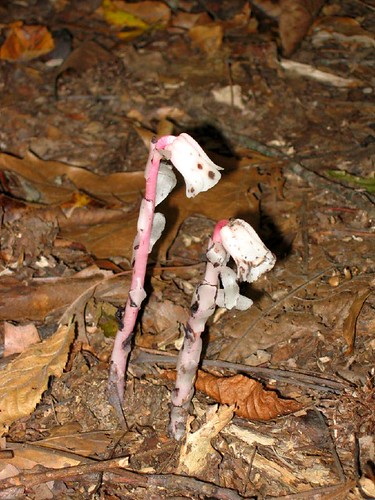
Quite a pair. Indian pipe, Monotropa uniflora.
(*photo credit)
April 24, 2023 Taking Daughters and Sons to Work Day
Note carefully that not everyone can observe this day due to working conditions, but many can -- and the rest can compensate. The thrust is to give a basic sense of work to youth, and how much it takes to earn one's family's daily bread. Perhaps the task is easier to fulfill for those working at housework, home office, family farm, and business. The basic gesture is worth implementing even though the rush of the academic year may make April less than ideal. Why not during summer vacation?
All things said, there's more to the day than a single youth event. Youth need to experience individually performed work in some form and to appreciate results of their labors. In former times, with fewer working regulations for youth and with more low-skilled labor opportunities available, things were different. Many farm youth had necessary everyday chores to do (we milked cows twice a day, 365 days a year -- and an extra day in leap year). Our summers were spent in a host of smaller jobs suited to our respective ages and abilities. We learned the work ethic when amount and degree of work varied considerably among a hundred different farm tasks each year. Youth working part time is salutary and an experience that will last for life.
The horrors of child labor in times past in America must be acknowledged; so is child labor today in unregulated and emerging nations with few regulations. Many states have rather strict laws as to the age at which youth may start to work, number of hours, and under what circumstances. Strict regulations may scare potential employers. Did I work too much in my younger years? I don't think so. The environment was healthy and the work supported an entire family enterprise of which we were an integral part. We learned to do our particular task and were personally accountable for its success. That meant a work ethic that was expected and did give satisfactory results, which made us proud of accomplishments.
Those directing volunteers say that many youths do not know the first thing about work and are essentially too unskilled for minimum wage jobs. They may undergo a rapid learning curve and be the better for it. A work-learning experience is not taught in classrooms, but in the workplace; it demands diligence, patience, effort, and a sense of responsibility. But it also demands an ability to use instruments: a broom, hammer, hoe, and other tools; for modern youth it can involve computer skills.
Appropriate technologies suited for youth ought to be provided with an introductory stipend for beginners that may be a minimum wage (if not taken advantage of by employers). Youth who run errands and do appropriate tasks for sponsors of their high school education in the Christo Rey schools in many cities and other such work/study programs are moving in the right direction. Youth need opportunities that are learning experiences, and there are plenty to go around is we just take the effort to find them.

Northern cardinal, Cardinalis cardinalis, in spring tree.
(*photo by Sally Ramsdell)
April 25, 2023 Letting Every Day be Arbor & Bird Day
Each year we celebrate Arbor & Bird Day by focusing on ways to promote conservation and protect trees and birds, those classes of creatures that delight us in sight and sound. Let's now reflect on the combination of trees and birds and how they complement each other. Trees attract birds, and birds vocalize their joy and communication on lofty tree perches. Trees furnish nests, fruit, and haven for birds, and birds cluster in trees as homesteads of comfort. As within all nature there is a symbiotic relationship.
Many varieties of birds prefer the edges and others the actual interior of forests. Here they find an ideal habitat for resting, nesting, and protection from predators. Fragmentation of forests prove threatening to some species, especially those susceptible to cowbirds that lay eggs in other species' nests. Birds are often found to withdraw into the forests to get away from the noises and congestion of modern life. They need areas where strange sounds are muffled by tree cover. Robins use branches of trees to entice their young to leave the nest, and build confidence in branch hopping and flying. Thus, trees are training schools for nestlings preparing to fly. Woodpeckers use trees as sounding boards for mating calls; mockingbirds like the tallest ones for perches; and owls claim trees as observation towers to find ground creatures below. Fruit trees (e.g., cherry, mulberry, and peach) furnish dessert for the aviary family. In winter, swarms of starlings descend on a holly or hawthorn and suddenly denude them of their berry supply. The same occurs when flocks devour remaining persimmons in minutes.
The relationship of trees and birds affects us as human beings. In winter, naked tree branches furnish momentary bird perches and evergreens laden with snow protect and offer secure refuges for non-migrating species, from cardinals to wrens. During the foliage season trees are shelters, nesting spots, and resting places for a host of migratory species, many threatened by loss of habitat. Tree plantings are valuable as urged by the Arbor Day Foundation. Plantings counter opportunistic and imported diseases assaulting a variety of native species (hemlock, ash, elm, white oak, dogwood). Diseases threaten more and more tree varieties.
Trees are for the birds, and for others also. Trees pay a price through deforestation, road construction, and urban development. Both trees and birds require special favors; trees can propagate naturally but plantings render full restoration; birds can feed themselves, but due to depleted habitat are helped by winter feeding and through droughts. Why should men delay to plant all sorts of good trees because they may not live to see them fully grown? What can a man do better on the face of the earth then to cultivate and beautify it? While ever ready to depart, lover of beautiful trees should act as though expected to live 1000 years. Ethan Greenwood, "New England Farmer," 1832.

Oldest rocks in Kentucky, with travertine, below Interstate 75. Fayette Co., KY.
Details here.
(*photo credit)
April 26, 2023 Highlighting America’s Interstate System
History may call the Eisenhower-era Interstates in our lower forty-eight states the monumental achievement of the United States in its age of glory in the 20th century. Other developments may compete, but the 42,000 plus miles (and climbing as new roads are added) of highways tie our country tightly together. It is now easy to drive from one ocean to the other through simple road directions, supplied with ample rest stops and local accommodations. Without maps, I can travel to within a few miles of most of our nation's population (though those final ten miles are much more problematic). The Interstate roads are relatively safe, well engineered, containing uniform signs, built for moderate speed, and interconnected at key locations. For rural people otherwise caught in isolation, the Interstate system offers access to market products and services. Interstates are a godsend.
For a quarter of a century, I heard the sound of I-75 traffic while in Rockcastle County. Virtually every long trip I have taken has made use of one or other of these highways and, as I now slow down, I find that I have explored all but six of the main numbered American Interstate highways. Though there is some monotony in Interstate travel, there are some spectacular sites such as I-70 in Colorado when entering the Rockies and I-40 as it passes through the Great Smokies near Asheville, North Carolina. The roadcut on I-68 along with its museum in Maryland is a true geology lesson. Younger folks take high speed Interstates for granted and never experience traveling over the older U.S. Highway system, right down the main street of virtually every town in America.
In recent years people have sought to build Interstate 66 (not the famous cross-country U.S. 66). But a significant number of us do not find that this added route from Washington DC westward to the Pacific coast is necessary -- and have argued against it, because of its routing through environmentally fragile regions. Why add this additional highway when sufficient parallel ones have already consumed good farmland and greenspace? Widening from two to three and more lanes in each direction can prove more environmentally friendly than carving still another highway across the countryside.
The Interstate system wears with use and needs infrastructure repair, especially at major bridges. Furthermore, has this system enticed more traveling than may be warranted and thus extra fuel consumption? Has the system resulted in further escape from urban areas with congested suburbia, exurbia and urban sprawl? As citizens, we must guard the Interstate System's integrity with ever better signs and rules: reduce traffic flow that exceeds posted speed limits; require spacing between traffic vehicles, especially in inclement weather; and tax EV and non-gasoline-fueled vehicles for highway maintenance. The Interstate system is not perfect -- but we can take pride in this American monument.

A morning adventure begins.
(*photo credit)
April 27, 2023 Awaiting the Next Rise of the Nuclear Phoenix
We learn from Egyptian mythology that the phoenix is a beautiful isolated bird that lives in the Arabian Desert for 500 to 600 years and then sets itself on fire, rising renewed from the ashes to start another long life. This symbol of immortality may be ascribed to the nuclear industry, which seems apparently dead due to the grave concerns about nuclear safety, uranium mining and enrichment problems, permanent disposal of nuclear wastes, and expenses in case of accidents. Add to this the Japanese Fukushima Daiichi nuclear disaster and advanced nations’ nuclear phase-out, and nukes may seem to be dying -- but don't count on it.
Are nukes needed? No. Renewable energy emergence and electric vehicles are having their effect in cutting the need for new fossil fuel powerplants. Unfortunately, the rise in energy demands in much of the underdeveloped world is resulting in extending the lifetime of non-renewable energy sources such as natural gas and even coal. The nuke sponsors claim their source is non-carbon (not totally true) and should be extended in service as long as possible. Thus, aging nuclear powerplants are still in service in many parts of the world. The pro-nuke industry always has a response because it is accustomed to flourish by grace of the government's fuel processing and willingness to bear insurance liabilities -- but multibillion dollar facilities make the response somewhat muted. Likewise, nuclear proponents regard theirs as clean energy in contrast to dirty coal. Furthermore, the nuke industry hopes that the public’s concern about climate change will regard nukes as a carbon economy alternative.
Is there a military connection? Yes. Few want to admit it but the movement to acquire nuclear weaponry on the part of Iran and the failure of the nuclear "powers" (United States, Russia, United Kingdom, France, China, India, Pakistan, North Korea, and Israel) to move aggressively to disarmament all add to the nuclear power peril. When one of these "powers" agrees to assist another to acquire nuclear energy and thus eventually the ability to make nuclear weapons, it spreads an atmosphere of instability in our fragile world. Unfortunately, it is the public's desire to separate military from citizen nuclear uses that is the Achilles heel of the nuclear age; in actuality, these cannot be separated, for once enrichment starts at a low civilian-use level, it is far easier to escalate this process to military-grade materials.
Will nuclear wastes disappear? No. The great impasse that still exists within the nuclear industry is the nuclear waste accumulating at powerplants' storage places. A Utah Native American tribe has offered to store wastes at their reservation, but can they speak for their unborn descendants who may curse the decision? Placing or transporting waste materials near populated locations has proved a major point of contention for those along the proposed rail, air, marine, or road routes. Dealing with the nuclear phoenix is where an ancient myth touches on raw reality.
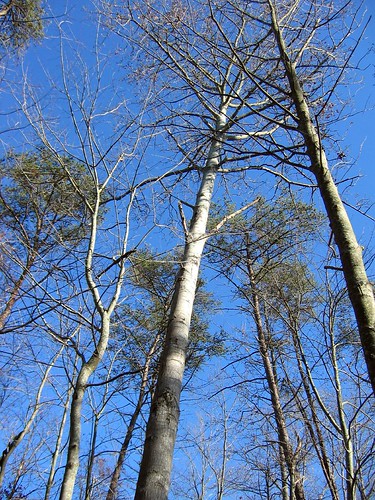
Bigtooth Aspen, near southernmost edge of range. Rowan Co., KY.
(*photo credit)
April 28, 2023 Observing Holocaust Remembrance Day
During this decade most of the thinning ranks of Holocaust survivors will soon depart this life. Even World War II youngsters are now in their 80s. Our memories fade but the hope of those who were affected by the Holocaust and the horrors of Nazism of eight decades ago are still taken aback by deniers of the Holocaust -- a felony in some European countries. Thinning ranks of victims and continued adherence of deniers makes a remembrance all the more imperative: remember the millions of victims and confront the deniers.
Such a terrible 20th-century happening should never occur again, but how do we ensure that this does not happen? Looking at those horrible concentration camp pictures requires us to muster spiritual energy to face reality. How could a so-called civilized continent have had such a disaster take place?
Remembering takes on a variety of forms and it may involve the vivid depictions of allied liberation and the emaciated bodies of the liberated. A revisit to the gas chambers will be quite difficult for most people -- for we can only experience limits to this sort of wrongdoing and assaults on the human spirit. Furthermore, most of people today do not know Holocaust victims and have no first-hand information about that horrible period.
A proper remembrance could include any of the following:
* Offer our day's troubles to God as a contrite prayer in atonement for the Holocaust and similar crimes of genocide -- thus individually repairing damage that this tragedy caused globally;
* Recite prayers at a public affair this week in remembrance;
* Challenge those who wish to deny the occurrence, justify the happening, or downplay the importance of the Holocaust; and
* Retell and emphasize the life and story of Anne Frank and others who were the victims of the Holocaust; and
* Recall the heroic action of St. Maximilian Kolbe and those who gave their lives in the torture chambers in order to save the lives of others.
The best remembrance is to see that human rights are always observed. When that is not the case, we need to hold our country accountable for camps now holding supposed terrorists or criminals and for spying on other people. Holocaust Remembrance Day resolves include: treating all with respect is a good remembrance of victims; abolish the death penalty; treat with dignity all prisoners; and call for the release and community service for many non-violent prisoners. No acts will bring those victims back, but their sacrifices were not in vain if we learn lessons to pass to future generations. Yes, so-called civilized people can do horrible things to others and so we resolve to show responsibility for the rights of all human beings. As twentieth century Jewish philosopher Emmanuel Levinas puts it so well, "We are responsible for the others' responsibility." Reference: Otherwise Than Being, p. 117.

Megaphasma denticrus, giant walking stick.
(*photo credit)
April 29, 2023 Confronting Mean-Spirited Egalitarianism
Perhaps we are all at fault occasionally. We make a comment that a particular person does not know how to do something quite simple – and what I was able to do at their age. The assumption is that we are all created equal in aptitudes and those who are differently-abled have some fault, namely, being lazy or absent-minded or unwilling to function diligently. However, if there is a fault it rests in our expecting a form of egalitarianism that simply does not exist. Sometimes this is related to work experience which the other party has never had the opportunity to experience when growing up. We the experienced do not have a sense of compassion for the untrained.
For many reasons, this type of mean-spiritedness is all too frequently heard. It is based on prejudice, personal pride, lack of charity, or the raw assumption that everyone acquires experience in the same way and at a given time. If the person lacks a way of making a meaningful living, then our judgment may be all the more harsh; we blame the person for now having a worthwhile income or for failure, even though it may be due to illness or no fault of their own. We can misjudge their presumed failures.
Mean-spirited individuals assume that all people have equal opportunities and the lucky breaks they themselves have had are open to all others. All of us are unique and sometimes we get fortunate gifts and openings that are denied others -- but these privileges can be often forgotten or overlooked or considered as part of our diligence and care. Comparisons can be cruel and may completely miss the mark, and yet the mean-spirited do select points to compare without recourse to the others that are omitted. If we look further, we find that the person we are commenting on suffers from deep depression or other illnesses that have a grand way of cutting the so-called equality of opportunity.
Often mean-spiritedness covers over the demand for utmost charity at all times; this suspending of charity bodes poorly for resolving troubles and problems. The roads each of us use differ in surface, weather, means, and human condition of the traveler. In fact, the more factors we discover, the less likely it is that one could have changed the way the unfortunate victim of the comments would have acted. A generous spirit is one who is very slow to judge another – and the Lord encourages us to such a practice. If we have nothing to say in a beneficial way at least we must keep quiet.
We come to the conclusion that "all things being equal" is a false situation that never exists. We may be created equal and have equal rights, but we come with baggage, some not of our own choosing or making. If we overcome our cultural biases, we find our differences make for alternative ways of acting. Mean-spiritedness constructs a false rigidity that must be softened and mercy shown. And the whole world could do less judging.
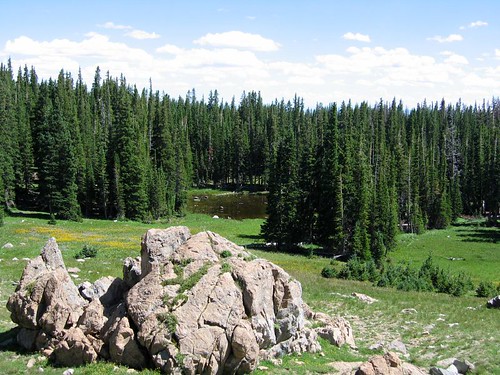
Hidden pond. Near Centennial, WY.
(*photo credit)
April 30, 2023 Seeing Christ as The Life
I am the resurrection and the life. If anyone believes in me, even though he dies he will live, and whoever lives and believes in me will never die. Do you believe this? (John 11:25-26)
The faith journey of Lent now becomes a major focus in the Easter season – and the Resurrection event is now seen with even greater emphasis – and is fully blended in the springtime of new life. We are designated for endless happiness and the sign that gives us eternal joy. Christians are called to make the Easter event the principal reflection of this season.
This is because we couple the risen Christ with the promise that we are to rise again at the end of the world. Everything we do is through a total commitment to his word. Even the act of sprinkling Easter Water on plants and animals and all creation expresses a belief through action on our part. Yes, we are blessed in the rising of Jesus; we are blessed with the promise of our new life.
Christ is the sign of victory. To believe is to see that death has been conquered, even though it remains present in our world and we must be willing to undergo the inevitable. But as believers this is not the end but a transition to a new form of eternal life that will be richly rewarding and everlasting. For Christians who are persecuted in Africa and Asia, this is a happy moment that overcomes current hardships.
Christ calls us to life. The question Jesus asks Martha is asked to every one of the billions who followed her on the path to a Christian life, namely, do you believe? This is the heart of our own life and should we answer "No" to this free will act of either life or death, we are the authors of our own fate. Our very life depends on the way we answer the call, both in word and in deed.
Christ enlivens us. We come to life by being close to Jesus in our prayer life. The enthusiasm that is to be found in each committed Christian gives a sense of energetic bounce to what we do as works of mercy for others. Truly, some people suffer from a mental state of depression and lack that feeling of energy to rise and do what needs to be done. But their lives have phases that we all have experienced during the pandemic.
We are called to be other christs. If we accept that Christ has called us in a special way and see this as a treasured gift worth imitating, then we are to be the new "life of the party." However, this is not meant for extroverts alone. All can, in their own way, make high quality lives and exude happiness through smiles and kindness. At times, we all need rest, just as does a lively symphony. To deny this need for rest is to think our results are due to busyness instead of us being God’s instruments.

